Selecting the Best Hunting Binoculars
MenuHunters often ask "What are the best hunting binoculars for the money?" What type of binoculars should I be looking for? Since our readers live and hunt in a wide variety of locations with a correspondingly wide variety of game as well as having significantly differing budgets, we'll talk about hunting and optical concepts to make your choice easy. That way you'll be able to get the biggest bang for your buck and get the best binoculars for hunting in your area and on your budget.
Best Hunting Binocular Considerations
All kinds of questions are bound to come to mind when we ask ourselves "What are the best binoculars for hunting?" If I can't afford to spend a small fortune, what should I do? At the top of the question heap should be ones like:
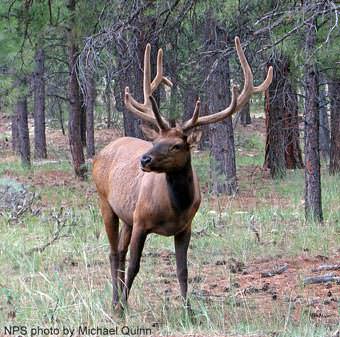
- "What type of binocular will help me to identify game before it recognizes I'm nearby?"
- "What will help me to be able to see well enough to be satisfied that, if I make a shot, I'm not going to have a wounded animal suffering because of me…."
Happily, those two questions are closely related and answering one will serve to answer the other as well.
Hunters are outdoor enthusiasts who typically find that their hunting binoculars satisfy their optical needs during the rest of the year. Their questions often revolve around value and how can they get their money's worth so that their binocular will significantly contribute to the success of the hunt.
How to Budget for Hunting Binoculars
It's probably fair to say that the majority of hunters in the United States have been so budget-conscious in the past that they've used binoculars purchased new for which they had spent significantly less than $100. Nowhere is the saying "You get what you pay for" more true than with binoculars. Money spent on a quality hunting binocular should be viewed as an investment which will yield dividends for its owner over time.
Unfortunately, it's much easier to communicate the advantages of using quality glass by demonstrating them under difficult conditions instead of trying to use words, as we're doing here! Let's give it a try, anyway….
With these things in mind, a frequent question that's raised asks "Is it really true that I should figure on spending about as much on a binocular as I do on one of my hunting guns in order to see adequately?" Let's put it this way — maybe you're different, but most hunters will (or should!) spend a lot longer looking through their binoculars than they will looking through their rifle scopes. So what difference does that make, you ask?
"Sharpness and brightness are the two biggest factors in evaluating the worth of binoculars. It doesn't matter if it can withstand falling off a pickup hood, costs $1,000, or was made by German elves. Without the capacity to resolve details, a binocular is only so much metal and glass."
John Barsness in Optics for the Hunter
Why Quality Glass Matters
The reason for considering how long you look (or should be looking!) through your binocular is just this: Cheap/inferior optics will produce painful, distracting eyestrain and often headaches after extended use. The best hunting binoculars for you will be those that you can use comfortably for hours at a time and which will allow you to see what you need and want to see. A binocular's purpose is really to let you know what's coming before the unaided eye can see it.
Many hunters try to see what's coming with the unaided eye and only then use the binocular to see details — usually to avoid that uncomfortable eyestrain caused by inferior optics. Some hunting tactics rely heavily on binoculars while others rely on them to a lesser degree. No matter what your tactics, binoculars will always play a vital role in the success of your mid-sized to large game hunt. Why is that, you ask?
Of our five senses, as humans, our best one for knowing what's happening nearby is not hearing or smelling, but seeing. It just makes sense that we'd want to magnify the power of that dominant sense while hunting — and binoculars do that wonderfully! They don't just help to see further, they also help to see through heavy vegetation, spot movement we'd miss otherwise, and help us to see better in low-light conditions (without batteries!).
One of the pieces of advice that deer hunting experts (among others) often repeat is to "spend as much money on your hunting binoculars as possible…plus a bit more." There are good reasons why so many top-tier hunters recommend this approach. Better binoculars will allow you to see with incredible clarity, see subtle contrasts, see into the shadows better, see the action at dawn and dusk, and do all of that for hours without headache or eyestrain. We occasionally hear hunters asking if they're doing the right thing financially while they're waiting for good quality binoculars which they've ordered, but we hardly ever hear a hunter say he regrets having bought the best glass he could afford after he's used it a couple of times!
Technical Considerations
How should you choose a binocular that will fit your particular needs? If you've not already considered those needs from an optical perspective, we recommend starting with the "7 Easy Tips on how to get the binocular you want" and then going to the How to Buy Binoculars page to walk through how meaningful each of the items may be to you. We suggest expecting to spend a minimum of $150 to $200 for binoculars as tools to help make for a successful hunt. If you're serious about hunting, you'll avoid any binocular that doesn't say it has prisms made of BaK-4 optical-grade glass and "fully multi-coated" glass surfaces. Those may not have been readily available years ago, but they're basic for hunting today.
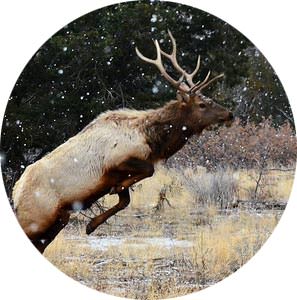
Photo by Larry Lamsa
Try the better binoculars you're able to beg or borrow from nearby friends, relatives, or bird watchers, but do it in the early morning and twilight if you'll be hunting at all during those times. It's even better if you can use them at those times on a miserable, overcast day! Nearly all binoculars can provide good images in the middle of the day, but low light conditions show which are the better value and, consequently, probably the best hunting binoculars of the ones you might try.
Remember that a good binocular is a precision optical instrument. It won't be able to care for your needs over time unless it's treated with care and respect. If you don't have a binocular that's good enough and valuable enough to treat with care and respect, then it's time to invest in one.
What About Using Bird Watching Binoculars?
Are the binoculars favored by bird watchers the best for your situation? A person often sees reviews that focus on birdwatchers' needs and interests — what above everyone else's needs and interests? To boil it down to a simple question, if considering "bird watching" vs "hunting" binoculars, which is the better buy?
Hunters around the world owe a debt of gratitude to bird watchers for pushing manufacturers to compete strongly on both quality and price. Bird watchers often try to identify subspecies by subtle variations in marking and color, both of which can require excellent resolution of details, color neutrality and contrast in both good and low light conditions to achieve. Those optical qualities are just what hunters need to be able to detect game moving into their area.
Whether a manufacturer markets a binocular to bird watchers, horse racing fans, boaters, football/baseball fans or hunters is meaningless if that binocular's specifications meet your needs. To say it a bit differently, if you've properly analyzed your needs, you will be able to settle on specifications to meet your needs regardless of what someone may say about the possible uses for the binocular he's selling.
"Through binoculars we eavesdrop on the wild, bring animals and prairies and mountains almost inside us. If eyes are indeed the mirror of the soul, then binoculars can magnify our souls."
John Barsness in Optics for the Hunter
Binocular Values
While inflation typically causes production costs to rise, we've had an extended period of little or no inflation and solid competition between manufacturers. During this time, we've seen increases in the quality of optics and decreases in optical retail values. Getting good optical values now is easier than ever before. If circumstances allow, it's probably the better part of wisdom to pick up a good binocular before prices start going up.
Specifics for Hunting Binoculars
In addition to the principles outlined in How to Buy Binoculars, here are some things to remember in selecting hunting binoculars:
- Weight and objective lens diameter are related. You'll probably do best with an objective lens of about 40-42mm diameter. Whatever configuration (10X42, 8X36, etc) will work best for you, it won't hurt to look for a binocular that's built compactly for its configuration because that'll make handling it easier when you're carrying your other gear. Remember that a binocular that's "built compactly" isn't necessarily a "compact binocular"! (Stay with an 8X if going for less than a 40mm objective lens to avoid the eyestrain caused by a small exit pupil.)
- As magnification goes up, the light getting through to your eyes is reduced if all other things remain the same (you see fewer details due to a darker image). Because of this, hunting binoculars should have the least magnification reasonable for your circumstances. If you'll be viewing over significant distances, a 10X may be best for you — but see how large an objective lens' diameter you can tolerate without getting too heavy. If you're in a wooded area, 8X should be just fine and you may do well with a 6X or 7X to get a brighter image and larger field of view.
- Look for a binocular with a decently large field of view. It's just sad to hear hunters talk about how they missed a shot because their binocular's narrow field of view didn't allow them to see nearby game until it was too late. Increasing the magnifying power and decreasing the objective lens diameters often work to reduce the field of view.
- Decide how important it is for you to see details and how much you'll use your binocular in low light conditions. If you're looking for a roof prism binocular for its size and durability, wanting more details and/or lower light means you'll be focused on getting silver alloy or, even better, dielectric prism coatings. More details and/or lower light mean you'll also be focusing attention on ensuring that you're getting fully multi-coated lenses.
Here's to enjoying the great outdoors!
Home > Hunting Binoculars

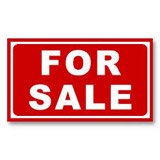 Our Optics for Sale
Our Optics for Sale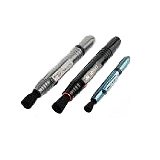 Binocular Accessories
Binocular Accessories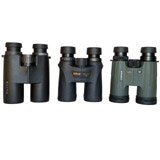 Binocular Comparisons
Binocular Comparisons

Your Comments
This site is for you, our readers. We appreciate your comments very much.